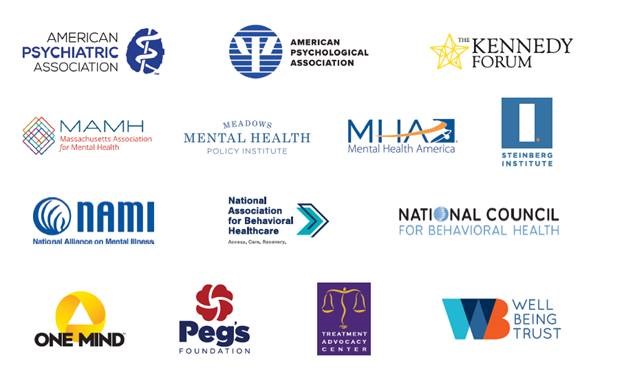Historic Mental Health Leadership Alliance to Present Government Officials with 7-Pillar Roadmap to Stem Crisis in Mental Health and Substance Use Care as Americans Grapple with COVID-19 Pandemic
Roadmap for Recovery Includes Focus on Early Intervention, Emergency Crisis Response, Leveling of Racial and Economic Inequalities in Health Care, Parity in Payment
by Health Insurance Plans, Among Other Core Issues
Washington, D.C. – December 16, 2020 – The chief executives of the nation’s 14 leading mental health advocacy organizations and professional associations today announced the formation of a unified coalition that will engage with the federal government, governors and key elected officials in 50 states to introduce a roadmap for accelerating effective mental health as the nation struggles to weather the COVID-19 pandemic.
As more than half of all Americans struggle with mental health issues due to the impact of COVID-19, the leadership group is a first-of-its-kind, solutions-focused collaboration among the top mental health organizations and their chief executives to address the crisis and offer state and regional officials a blueprint for systemic reform. The partnership effectively establishes and rallies a rarely seen solidarity in the mental health space, and speaks to the urgency of the mental health emergency, reminiscent of previous collaborations established to address major health crises, including cancer in the 1970s and the HIV/AIDS in the 1980s.
The leadership coalition is composed of CEOs from the American Psychiatric Association, the American Psychological Association, the Massachusetts Association for Mental Health, Meadows Mental Health Policy Institute, Mental Health America, the National Association for Behavioral Healthcare, the National Alliance on Mental Illness, the National Council for Behavioral Health, One Mind, Peg’s Foundation, the Steinberg Institute, The Kennedy Forum, the Treatment Advocacy Center and Well Being Trust.
In a joint statement, the leadership coalition said: “The mental health crisis that has evolved along with the COVID pandemic is unprecedented. The levies have broken on an overwhelmed system of care and state leadership must move to address mental health care as an integral aspect of their pandemic response. As leaders in mental health care, we offer a viable roadmap for immediate and long-term changes that will lead to a mental health care system capable of saving our nation.”
The leadership coalition’s plan – titled A Unified Vision for Transforming Mental Health and Substance Use Care – calls for policy, programs and standards that prioritize mental health care and address the social and economic conditions – including racism and discrimination – that disproportionately impact people of color and the poor, and result in inadequate and inequitable access to effective, humane treatment.
The CEO coalition was established in early 2020, and the group began meeting in emergency sessions weekly at the onset of the pandemic, which has greatly exacerbated the fault lines in an already fractured mental health system and heightened mental health issues across our nation – including anxiety, depression, isolation, addiction, domestic abuse, and suicide. By proposing “shovel-ready” solutions, the group is looking to harness public-private partnerships and inspire systemic change.
“Mental health needs to be a priority of everyone, particularly now in the context of COVID-19 and everything that has gone on this year,” said Daniel H. Gillison, Jr., co-convenor and CEO, National Alliance on Mental Illness. “It requires immediate action by the new administration, as well as state and local governments in all 50 states, and an acknowledged, consistent commitment to fix what’s broken in our system of care.”
Just as the public health care system was unprepared for a pandemic, an unprecedented mental health crisis afflicting half of all Americans has overwhelmed the mental health care system. Since the onset of the pandemic, prevalence of depression symptoms have jumped three-fold, overdose deaths have increased in 40 states, and the CDC reports that 25 percent of young adults struggle with suicidal ideation.
In response, the group’s vision statement that they will introduce offers a detailed strategic plan to stem the current crisis and secure the future. The strategic plan offers tried-and-tested “pathways for success” across seven critical policy areas identified as:
- Early identification and prevention, especially for families and young people;
- Rapid deployment of emergency crisis response and suicide prevention;
- Leveling inequities in access to care;
- Establishing integrated health and mental health care to ensure “whole-person” well-being;
- Achieving parity in payment by health plans for mental health and substance-use coverage;
- Assuring evidence-based standards of treatments and care; and,
- Engaging a diverse mental health care workforce, peer support and community-based programs.
Included in the vision is a detailed proposal for how the new Administration, Congress, Governors and state and local lawmakers must work in tandem with the business community and the non-profit sector to promote systemic changes in the mental health care system.
Among the seven suggestions are a number of ideas that can be implemented quickly, such as, embracing telehealth, and implementing strategic shifts to early intervention that can help provide relief by bringing telehealth outside of a clinical setting – and into schools, community centers, prisons; fast-tracking new emergency response systems, such as the new “988” National Suicide Prevention Lifeline, for immediate access on mobile carriers; and, engaging a diverse mental health care workforce, providing additional support means by expanding access to peer support groups and community based programs.
“We need bold steps from our government and the business community alike,” said former U.S. Rep. Patrick J. Kennedy, founder of The Kennedy Forum. “Just as a number of talented infectious disease experts are guiding the country’s medical response to COVID-19, it is imperative that mental health experts be given the opportunity to guide our nation’s mental health recovery efforts. We encourage all state governments to engage with mental health leaders, bring them into pandemic-related responses, and actively facilitate their communication with communities across the country.”
“We call on the new administration to appoint leaders who understand the urgency and who will advocate for resources commensurate with the need,” said Danna Mauch, Massachusetts Association for Mental Health President and CEO. “The lesson of the COVID-19 pandemic is not simply about our lack of preparedness. It is also about our resourcefulness as a society to mobilize public-private partnerships in response to public health emergencies, including the behavioral health crisis in America.”
“Every person living with mental illness or substance use disorder deserves prevention, early intervention, treatment, and recovery services just like any medical illness,” said American Psychiatric Association CEO and Medical Director Saul Levin, M.D., M.P.A. “The document creates a roadmap for both the federal government and the states, as well as the public and private sectors, to ensure parity for mental health and substance use services.”
“Everyone acknowledges that there is a problem,” said Arthur C. Evans Jr., CEO, American Psychological Association. “What distinguishes our plan is that we offer specific, workable priorities and solutions for meeting current needs for millions of Americans and transforming the system of care for the future. We welcome the opportunity to work with local and state leaders and to provide many more details on our plan.”
# # #
Organizations and CEO Leadership
American Psychiatric Association / CEO & Medical Director, Saul Levin, MD, MPA, FRCP-E
American Psychological Association / CEO and Exec. Vice President, Arthur C. Evans, Jr., PhD
Massachusetts Assn for Mental Health / President and CEO, Danna Mauch, PhD
Meadows Mental Health Policy Institute / President and CEO, Andy Keller, PhD
Mental Health America / President and CEO, Paul Gionfriddo
National Assn for Behavioral Healthcare / President and CEO, Shawn Coughlin
National Alliance on Mental Illness (NAMI) / CEO, Daniel H. Gillison, Jr.
National Council for Behavioral Health / President and CEO, Charles Ingoglia, MSW
One Mind / Chairman, Garen Staglin; President, Brandon Staglin
Peg’s Foundation / President, Rick Kellar, M.B.A.
Steinberg Institute / Chair, Thomas Insel, M.D. (former director NIMH until 2015)
The Kennedy Forum / Former U.S. Rep. (D-RI) and Founder, Kennedy Forum, Patrick J. Kennedy
Treatment Advocacy Center / Executive Director, John Snook
Well Being Trust / Chief Executive, Tyler Norris, MDiv
###
Jan Wootten, jwootten@rubenstein.com, (202) 506-0606
Kristen Bothwell, kbothwell@rubenstein.com, (212) 843-9227
Andrea Helling, ahelling@rubenstein.com, (406) 369-034







